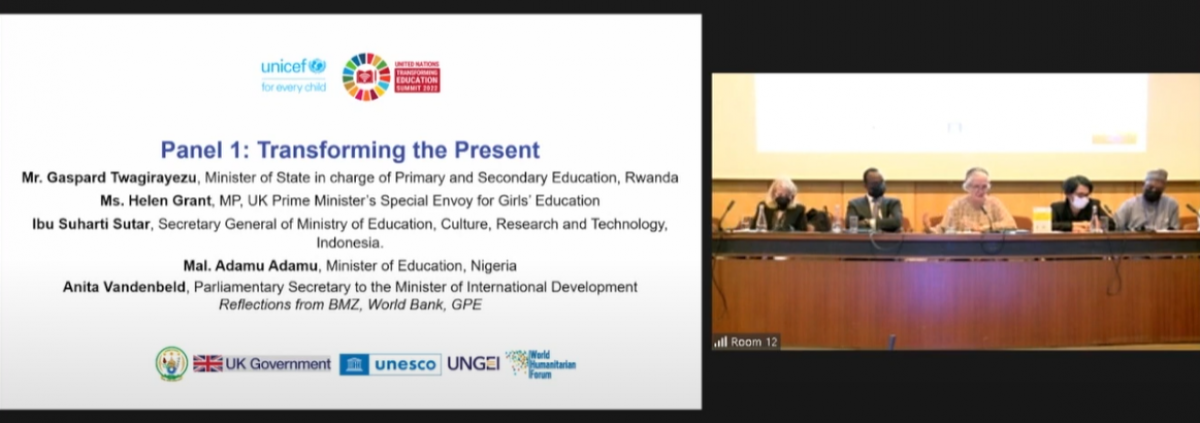Transforming the Present, Securing Futures: Education and empowerment of marginalized adolescent girls
Government of United Kingdom and Rwanda, UNICEF, World Humanitarian Forum, and UNESCO
This side event brought global education leaders together to highlight urgent actions and to drive transformative leadership and accountability to improve education outcomes for marginalized adolescent girls.
We are far from achieving the Sustainable Development Goal 4 target of 12 years of quality and inclusive education for every child. Adolescent girls, particularly those living in low-income countries and fragile contexts, face monumental barriers to accessing quality education. Girls facing intersecting forms of discrimination, such as those living in poverty or rural areas, girls with disabilities, and girls who are displaced, among others, face compounded multiple barriers and require whole-system efforts to secure their right to education. The COVID-19 pandemic has only exacerbated the challenges with increases in child marriage, early and unintended pregnancy, and gender-based violence. In this context, we are making a global call for urgent and at-scale action across three areas:
- Identify out-of-school girls and support their return to learning;
- Fit-for-purpose learning pathways for girls that addresses the foundational learning crisis and leads to skills for employment;
- Make schools safe, promote health and well-being.
We know that focused leadership can make real change and this side event mobilized education leaders around five enablers:
- Leadership: Build connections between Ministers, Young People, First Ladies, Education UN, Civil Society and Private Sector.
- Accountability: Use the global commitment to transform education through the Transforming Education Summit and other commitments, goals, and targets to drive action.
- Innovation: Share scalable and transferable multisectoral, digital, cost-effective solutions and innovations to accelerate impact.
- Data: Improve the quality and use of national and sub-national data on out-of-school children and the learning progress of the most marginalised children and young people.
- Financing: Invest to get learning back on track for millions of girls across low-income countries and fragile contexts.
The meeting aimed to:
- Build alliances amongst governments, international partners, civil society and the private sector to secure accountable transformative action and investment for girls in low-income countries and fragile contexts;
- Set out scalable impactful solutions that countries are taking forward; and
- Set the stage for the main TES in September 2022 to convene a platform for Ministers and partners to advancing girls’ education.
Speakers: Mr. Robert Jenkins, Global Director, Education and Adolescent Development, UNICEF; Ms. Catherine Russell, Executive Director, UNICEF; Hon. Min. Mr. Gaspard Twagirayezu, Minister of State in charge of Primary and Secondary Education, Rwanda; Ms. Helen Grant, MP, UK Prime Minister’s Special Envoy for Girls’ Education; Ibu Suharti Sutar, Secretary General of Ministry of Education, Culture, Research and Technology, Indonesia; Hon. Min. Mal. Adamu Adamu, Minister of Education, Nigeria; H.E. Ms. Fatima Maada Bio, First Lady of Sierra Leone (Video Message); Youth Leader [TBC]; Ms. María Juliana Ruiz, First Lady of Colombia; Honourable Minister Ibrahim Nanatou, Minister of National Education, Niger; Mme Delphine Ô, Generation Equality Forum; Ambassador, France [TBC]; Ms. Stefania Giannini, Assistant Director-General for Education, UNESCO; Ms. Feraye Ozfescioglu, Chief Executive Officer, World Humanitarian Forum; Ms. Catherine Russell, Executive Director, UNICEF.
